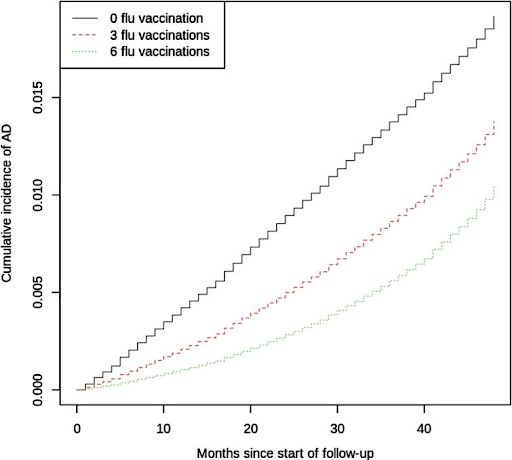Key Points:
- 8.5% of unvaccinated older adults developed Alzheimer’s after four years, while 5.1% developed the disease if vaccinated.
- Regular annual flu vaccinations are predicted to reduce Alzheimer’s disease incidence further.
In the past few years, the topic of flu vaccinations has been fairly polarizing, with many of the general public indicating that the flu isn’t that bad, so why bother getting an annual shot to prevent it? However, a recent study indicates that flu, or influenza, vaccination may have greater benefits than just preventing bad flu symptoms. Particularly in older adults, getting a flu vaccine may also help decrease one’s risk of Alzheimer’s.
The study, out of UTHealth in Texas, published in IOS Press focused on Alzheimer’s risk in older individuals (older than 65) from the United States. Bukhbinder and colleagues matched 935,887 vaccinated older individuals with 935,887 unvaccinated individuals and followed them over the course of four years. They found that those who were vaccinated had a 40% reduced risk of developing Alzheimer’s than those who were not vaccinated. Additionally, computer modeling showed that increased annual vaccinations decreased Alzheimer’s incidence further.
Influenza Vaccination Reduces Alzheimer’s Risk
Buhkbinder and colleagues took unvaccinated and vaccinated older individuals with an average age of 73.7 and matched them into pairs based on various factors that may influence Alzheimer’s risk, including asthma, high blood pressure, and heart failure. They determined that 5.1% of those who were vaccinated developed Alzheimer’s while 8.5% of those who were unvaccinated developed the disease after four years. This indicated a 40% decrease in Alzheimer’s risk with vaccination.
The Texan scientists also used computational modeling to estimate the effect of the number of annual flu vaccinations on Alzheimer’s risk. Here, instead of evaluating vaccinated versus unvaccinated individuals, they looked at the number of annual vaccinations individuals received over a six-year period, excluding individuals who received more than six vaccinations (more than once per year). Compared to the unvaccinated, it was found that an increase in the number of annual flu vaccinations correlated with decreased disease incidence.

Can Vaccines Prevent Neurodegenerative Diseases?
There is mounting evidence that the inflammation caused by an overactive immune system has lasting effects on the brain, influencing Alzheimer’s risk. Furthermore, various infections, including pneumonia and other respiratory infections, have been shown to increase the risk of neurodegenerative diseases, including Alzheimer’s. This suggests that the immune system’s response to these infections contributes to the genesis of Alzheimer’s. Preventing such infections with vaccines may have a protective effect against neurodegeneration. Indeed, treatment with vaccines for other conditions like tuberculosis is associated with a lower risk of dementia. This study in particular shows, in a large cohort, that influenza vaccination helps decrease Alzheimer’s risk. However, the underlying mechanism behind this effect is still unknown.
“This study found that, through an uncertain mechanism, influenza vaccination was associated with a 40% decrease in the 4-year risk of developing AD [Alzheimer’s disease] in patients 65 years or older,” the scientists wrote.
Research is still needed to tease out whether the age at vaccination time is a factor and whether vaccination can prevent or delay Alzheimer’s progression. Despite all this, according to this study, it definitely makes sense to go get your annual flu vaccine, because it may protect you from more than severe flu symptoms; it may help decrease your risk of Alzheimer’s.